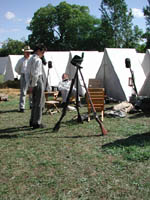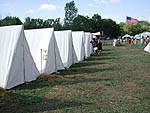
Re-enactors in camp
My opinion was that an attempt on Malden should never be made until there was an absolute certainty of success.
Why Hull did not attack Amherstburg
(from The Defense of Hull, p.58 - 59; 62)
The fort at Malden I was well acquainted with. In time of peace I had often been in it. I knew that it was capable of being made a place of strength, and that, in contemplation of a war, the British for some time had been using great exertions to put it in the best possible state of defence. I knew, that for near twenty years, a field officer had commanded, and about an hundred regular troops had constantly been stationed in it; and that there always had been a regular corps of British artillery attached to the command. The question was, whether, the troops I had under my command, so few of whom had ever been tried, I was to attempt to carry this fortress with the bayonet? For myself, particularly, when I considered what would have been the consequences of an unsuccessful attempt, I had a strong conviction that it would be wrong to make the effort, until we could have the advantage of heavy artillery. But finding that many of my officers, who had seen no service, were impatient at delay, and were destroying my influence with the army, and its discipline, by their complaints and censures - for their satisfaction, and not for my own, ...I called a council of war, in which it was decided that no attempt ought to be made on Malden, without the heavy artillery...

Re-enactors' camp |